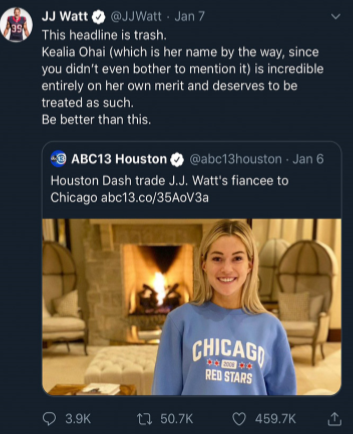By Leanne Hamilton
Executive Editor

Daily Mail article on Snapchat in which they address, Marzia Kjellberg, ‘and wife’
After a busy day of check ins and answering the phone, I finally had time to sit at the desk and skim through emails. Most of the guests have gone out to dinner so the lobby is quiet, except for slight creaks the old inn makes every now and then. Being an innkeeper for my summer job, I was used to late and quiet nights. One guest wandered down the stairs from his room and into the kitchen. he looked puzzled at the coffee and tea station. ‘Is there anything I can help you with?” I ask him in my best hospitality voice. He looks at my male boss standing beside me and says, “Yes actually, could I get a beer?” My boss walked to the pub tucked in the back with the guest following behind him. This is not the first time guests have answered my questions by turning to my boss and asking him directly. Everyone knows that sexism exists. Even more so now that the media is a monumental outlet. For example, last fall, while I was thumbing through the article page on Snapchat, I chanced upon a Daily Mail story about a robbery at the home of Youtuber Felix Kjellberg, famously known as ‘PewDiePie’ and Marzia, is wife Daily Mail had titled the article “PewDiePie and wife robbed blind”effectively demoting Marzia as less significant than her famous significant other.

Screenshot of football star J.J. Watts calling out ABC Network for referring to Kealia Ohai as his fiancee rather than her name.
Another media post included diminishing soccer star Kealia Ohai. Kealia was traded from the Houston Dash team to the Chicago Red Stars recently when an ABC Network tweeted about the trade with the caption “Houston Dash trade J.J. Watt’s fiancee to Chicago.” She’s a major soccer star, but ABC decided her engagement to celebrity football star J.J. Watt overshadowed the accomplishments she made in her soccer career. J.J. Watt called out the decision by retweeting the headline and calling it “trash” for not recognizing Kealia for her own achievements. The network station apologized by commenting on Watt’s retweet, but not to Ohai directly.
“Sexism is prevalent in the media,” said Alicia Brunson, a professor at Georgia Southern University who recently spoke at St. Michael’s during Martin Luther King week. “Women are represented in very limited roles that reinforce patriarchal ideologies and traditional gender roles,” she told me, adding “ownership of media corporations is dominated by men. It should not be surprising to see images and hear messages that are not favorable to women.” Sexism has become normalized, so that only the abhorrent occurrences seem to warrant attention,” Brunson said. Groundbreaking news or a violent event covered will often catch the attention of readers more than a potentially sexist quote the best way women can reassert their presence in the media is by becoming media literate, Brunson said. “If you do not like a media product do not buy it.” Brunson said, emphasizing that we need to take notice of the businesses that profit off of sexist media. “By avoiding these industries that have a tendency to be sexist in their marketing, women can choose not to fund the corporations” advises Dr. Brunson. I will admit that I continue to use Snapchat, but I did report the Daily Mail’s article to Snapchat directly. I could have used my social media accounts and made a post calling out the article to get other people involved in the conversation. Women can fight the media by taking to the media ourselves and making our own platforms. Platforms like Facebook, Instagram, and Twitter offer an outlet that women can use to speak out against sexism towards women. “Become a creative,” Brunson advises. “There are several media platforms that can be used to distribute a counternarrative that empowers women.”
There needs to be more conversation about sexism. It happens to women every day in the media and outside of the media. I talked with writer and editor for USA Today, Amy Ayres, an alumnus from ‘98. “I’ve had several editors — both male and female — who have been supportive or advocated for me in different ways,” she told me. Still, there have been times where she suspected her salary was lower than some of her counterparts. Beyond that, “There have sometimes been assumptions about my
career interests or ambitions tied to the fact that I’m a woman and a mother.” If more women have positions in leadership they will have more say on the content that is published in the media. Having a woman to collaborate with on the decisions of content, could make the team aware of sexism before it goes to print. “It’s vitally important that more women are given more opportunities to be in leadership positions also they’re in the room when decisions about the organization or about news coverage are made,” says Ayres.
By the end of the summer when I was the only one at the front desk I let the guests know that I was in fact a figure of authority in the inn and could get them whatever they needed. Often times when my boss had sat down to dinner or checked some of the emails I took notice of a guest that would ask him to get them something and I would proceed to get it for them. Soon they were asking me directly

